

The crypt in which eight members of the Dudley family’s remains are entombed in the Eliot Burying Ground. Legend has it that the pewter memorial that once graced the top was melted down to make bullets during the Revolutionary War.
Should Dudley Square be renamed Nubian Square? The dedication of statues and memorials as well as the names of buildings, public squares and avenues should have cultural importance for local residents.
Americans became aware of the significance of Confederate symbols when Dylann Roof, a committed white supremacist, decided to massacre nine confirmed church devotees in Charleston, South Carolina. This heinous event on June 17, 2015 induced many white moderates to remove from society the Civil War monuments that inspire racial oppression.
Since then there has been a national drive in cities across the country to rid their environment of hateful Confederate symbols. Counterprotests to preserve the symbols have made the news in some cities: Charlottesville, New Orleans, Memphis and Richmond. But the list of cities taking action against such monuments is extensive: Austin, Louisville, St. Louis, Orlando, Durham, Kansas City, Baltimore, Madison, Brooklyn and countless other places.
The national drive has been to remove offending statues and monuments. In Roxbury, some citizens intend to take the protest a step further. Sadiki Kambon is leading a drive to change the name of Dudley Square to Nubian Square. The reason seems to be that the Dudley family purportedly had slaves. The problem with that rationale is that the Nubians also had slaves. In fact, the Nubians have become mixed with other ethnic groups in Sudan, and they still have slaves today, according to reports.
Strangely enough, Roxbury citizens know little about the Nubians or the Dudleys. Nubia was adjacent to Egypt, and had a flourishing civilization at the time of the pharaohs. Their descendants live primarily in Sudan, where they have merged with Arabs and other African tribes.
While people know that the pilgrims came to these shores aboard the Mayflower and landed at Plymouth Rock in 1620, few are aware that 10 years later the Arbella led a fleet of ships from England to Salem Harbor, with a royal license to establish the Massachusetts Bay Colony. The Dudley family emigrated from England aboard the Arbella.
The Dudleys became prominent in Massachusetts and Joseph Dudley served as royal governor from 1702 to 1715. At that time Massachusetts also included what is now the state of Maine. Roxbury was established in 1630 as one of the leading Massachusetts towns. It was logical to name one of Roxbury’s major streets and the town square after one of its leading families. Roxbury was not annexed to the City of Boston until 1868.
The black population of Boston was negligible in colonial times. While the law permitted slavery, Boston’s economy was not based on agriculture that required countless workers for success. However, Boston became the national base of the antislavery movement. And Massachusetts became the first state to outlaw slavery in its constitution.
Now African Americans are called upon to decide whether to retain traditions with colonial roots or to replace them with remote African references.






